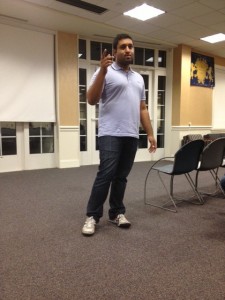Teach a man to fish and you have fed him for a lifetime, but loan him $1,000 to start a small fishing business and you have given him the power of microfinance — a Nobel Prize-winning concept Rohan Mathew of the Intersect Fund passionately advocated for in the Business Building lounge Monday.
Mathew’s claim to fame is co-founding the Intersect Fund, a non-profit that has grown into New Jersey’s largest microlender, after exploring the community near Rutgers’ New Brunswick campus as a student and being “depressed” with what he saw.
“You go four blocks in any direction off campus or downtown, and you realize you’re in another world,” Mathew said. “You look a little deeper at the numbers, and you see that in the city of New Brunswick there’s one in three families in poverty. That means one in three families — so imagine a family of four — are living on less than $20,000 a year. I don’t know what that is … That’s bad.”
Mathew found a common theme among local residents with low-paying service jobs, though. “We started hearing the same thing over and over: A lot of people had informal side businesses they were running as a way to put food on the table.”
That is when an unconventional but increasingly popular response to poverty caught his eye: microlending, the act of giving small loans — the Intersect Fund’s average is $2,000 — to low-income individuals.
“It was one of those things that you read about in a New York Times story and you get really excited about, because it’s a sustainable solution,” Mathew said.
Microlending is fueled by the idea that many low-income individuals, if given an opportunity to prove themselves, can better their economic situations in life through sheer ability and determination.
When reliable clients take out loans and the system works, the ceiling for any one individual depends solely on his or her own potential.
“If you grow this business and your primary source of revenue is this business, who are you limited by?” Mathew said, comparing a business owner to a service worker whose hours are controlled by a third party.
Microlending originally met the needs of third-world countries like Bangladesh when economist Muhammad Yunus started it through the Grameen Bankin in the 1970s, but had exploded into a worldwide way of doing business by the time Yunus accepted a Nobel Peace Prize for his efforts in 2006.
To determine whether candidates for taking out loans can be clients, the Intersect Fund has a three-part test: first, potential borrowers have to show that they need a loan for a viable business opportunity; two, show they can afford it; and three, prove they are likely to repay it.
Under the test the Intersect Fund’s return rate is above 98 percent, and by fostering client relationships and hiring local officers that know the lay of the land, an improbable idea born out of boredom has grown into a massive source of local entrepreneurship in the time Mathew graduated from Rutgers.

“In the three years since then we’ve raised over $2.5 million, we’ve trained over 1,000 entrepreneurs, and we’ve made over 250 business loans,” Mathew said. “We do more business than the four other non-profit microlenders in New Jersey combined.”
The takeaway from sophomore economics major Matt Scapardine of Net Impact, the student organization interested in socially innovative economics, was that microlending and the Intersect Fund are an example of how College students can get out there and positively affect the world around them.
“Even though we’re college students, we also have the opportunity and the ability to reach out to our communities — in very simple ways, it doesn’t take a lot of work — to make a difference,” Scapardine said.






